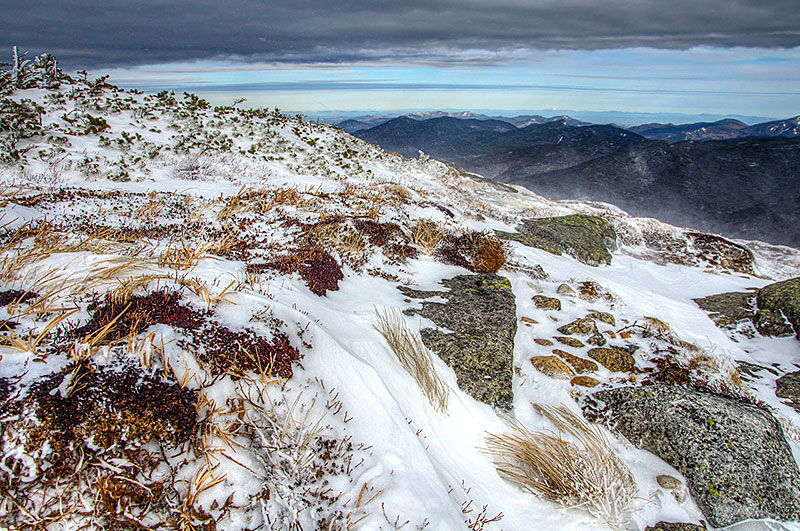Hikers’ Ethics
“Achievement is not about what you’ve done, but what you’ve gained from the experience.”
~ Lynn Hill
 Alpine plants exposed to winter conditions. Photo © Brendan Wiltse
Alpine plants exposed to winter conditions. Photo © Brendan Wiltse
Leave No Trace
Before you step on to a trail, before you enter the forest, become familiar with L.N.T. (Leave No Trace) principles.
It’s up to all of us, who frequent these summits, and the forests, to protect the landscape. With all the adventure, fun, and personal achievement that the activity of hiking provides each of us with, we truly hope that everyone realizes that the terrain is being shared. Whether you encounter a few other hikers – many – or no one at all, we implore you to approach each outing with the understanding that your presence impacts the terrain, and all those who will follow you.
- Human Waste. “Does a Bear shit in the Woods? YES, but it doesn’t leave behind wads of paper.” Trail usage has increased dramatically, in every month, since 2006. Toilet paper & wipeys seem to be sprouting alongside the trails, summits, and where hikers park. Planning ahead is key, and part of your pre-hike itinerary should include a proper place to attend to your biological needs, i.e. a known Porta Potty, or a stop along the way to visit a restroom. Sometimes you just gotta go … and if you do, practice good backcountry ethics. Relieving your biological needs at Trailheads – Summits – Trailside or any distance less than 50 yards (equivalent to 3 school buses parked end to end) is NOT exercising good form and is severely frowned upon for environmental reasons. TP, wipeys, personal hygiene products are to be packed out. Gross, right?! We all have too many reuseable plastic bags readily available for this, so much so, you can double bag what needs to be removed (i.e. bread / bagel bags, zip lock carrots, if you don’t want to look at it, resealable frozen vegi or fruit packaging, etc, etc, etc). Put your items in these bags, and then in your pack, and carry it out to be disposed of in a trash container.
- Foot Traffic. Above treeline, it is vitally important to stay on trail to protect the fragile alpine plants. In one year’s time, there are only a few weeks that provide the right ingredients for the plants to produce the food they need to survive. The rest of the year, they wait. One footstep can kill a plant, or make such an impact, that it may take hundreds of years to recover from. Take note of scree walls, and stay within them. Great care was taken to construct them in efforts to protect the fragile Alpine Zones. Moving outside of them to pass others is careless and improper.
- Respect WIldlife. The forest is the home of wildlife. We are the visitors. Everyday activities of wildlife are based on finding enough food to survive, and if they have offspring, teaching them how to do the same. Don’t approach wildlife to take pictures. It can be done safely from a distance. If wildlife appears to behave aggressively towards you, you are simply being warned that you are invading their space. Take the hint and back off.
- Don’t Pollute Water Sources. Ever notice how very clear most backcountry water sources are? Please keep it that way! Use the same principle described above in the Human Waste section, and don’t relieve your biological needs next to a water source.
- Trash. Please take extra care to make sure you don’t drop food packaging along the way. If you do come across something, be a good steward and pack it out.
- Trinkets. Don’t leave items behind. They don’t belong in the forest, or on the summits. Leaving items behind isn’t appreciated by others, and simply doesn’t belong in the natural environment.
